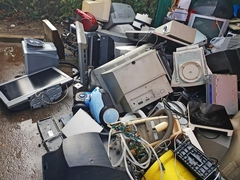"In 2022, an estimated 62 million tonnes of e-waste were produced globally." - World Health Organization
Engaging Consumers in E-Cycling: How Collaborative Programs Can Boost Brand Loyalty and Sustainability Efforts

Did you know that in 2023, global electronic waste is predicted to surpass 70 million metric tons? With the rise of technology, the challenge of dealing with discarded electronics - or e-waste - is becoming increasingly critical. For businesses in the Computer and Electronic Recycling Services industry, like Midwest Computer Recyclers, addressing this issue is not only about sustainability but also about building stronger connections with consumers. How can businesses leverage collaborative e-cycling programs to build brand loyalty and enhance their sustainability efforts?
This blog post aims to explore the intersection of consumer engagement and sustainability in e-cycling programs. We'll delve into the benefits of these initiatives, scrutinize how they contribute to brand loyalty, and provide actionable insights into crafting successful partnerships. Midway, we'll highlight real-world examples, particularly focusing on recycling services in Wisconsin Rapids, WI and neighboring areas to illustrate the tangible impact of well-executed programs.
The Rising Importance of E-Cycling
E-waste refers to electronic products nearing the end of their useful life. These items contain hazardous materials like lead, mercury, and cadmium, which can pose severe environmental risks if not properly managed. For Midwest Computer Recyclers and similar companies, addressing such environmental issues is not just a service, but a responsibility.
Why E-Cycling Matters for Brands and Consumers
For consumers increasingly conscious of their environmental footprint, collaborating with brands that prioritize sustainable practices can significantly enhance brand loyalty. According to a report by Nielsen, over 70% of consumers are willing to pay more for products and services committed to positive environmental impact. This creates a valuable opportunity for businesses in the Computer and Electronic Recycling Services industry to differentiate themselves by spearheading sustainable initiatives.
Collaborative E-Cycling Programs: A Win-Win Strategy
Collaborative e-cycling programs bring together businesses, local communities, and consumers, fostering mutual benefits:
- Businesses : Brands achieve enhanced reputation, customer loyalty, and long-term partnerships with environmentally conscious organizations.
- Communities : Localities receive critical support in managing e-waste, thus fostering healthier environments.
- Consumers : Individuals gain accessible, responsible ways to dispose of electronics, fulfilling their need to contribute positively to the environment.
Case Study: Midwest Computer Recyclers in Wisconsin Rapids
A shining example of a collaborative e-cycling initiative is Midwest Computer Recyclers' partnerships in Wisconsin Rapids. Partnering with local schools and businesses, Midwest Computer Recyclers launched an e-cycling drive that was successful in collecting over 20,000 pounds of electronic waste. By integrating educational workshops, they increased awareness of sustainable practices among participants, further strengthening their brand presence in the community.
Key Steps to Building Successful E-Cycling Collaborations
1. Identify and Engage Stakeholders
Pinpoint potential partners by analyzing the local ecosystem. Ideal collaborators often include schools, non-profits, and other businesses that share a similar dedication to sustainability.
2. Develop Inclusive Programs
Programs should not only facilitate e-cycling but also educate and engage the community. Organizing workshops or informational sessions on the impact of e-waste can significantly bolster the program's success.
3. Communicate Transparently
A transparent process that communicates the program's goals, impacts, and logistics can enhance trust and participation. Utilizing clear communication channels like newsletters, social media, and local media can ensure wide-reaching impact.
Actionable Advice for Midwest Computer Recyclers
To tap into such successful strategies:
- Leverage Incentives : Consider initiating trade-in programs offering discounts or loyalty points to encourage more consumer participation.
- Enhance Online Presence : Regularly update educational content on platforms and use targeted social media campaigns to engage environmentally-conscious consumers.
- Measure Impact : Regularly assess and communicate the program's environmental and community impact through reports or blog updates, reinforcing transparency and credibility.
Collaborative e-cycling programs present a unique opportunity for companies like Midwest Computer Recyclers to marry corporate and environmental responsibility with community involvement. Such initiatives not only help manage the e-waste crisis but also build lasting consumer relationships, enhancing brand loyalty.
In navigating the e-cycling landscape, businesses are encouraged to explore innovative partnerships and develop programs that resonate with the consumer's sustainable values. As a call to action, Midwest Computer Recyclers invites local businesses and organizations to collaborate in crafting mutually beneficial e-cycling initiatives. Together, we can integrate sustainability into everyday practices and drive significant environmental change. For more information, contact us.
By implementing these strategies and insights, businesses in the Computer and Electronic Recycling Services industry can effectively engage consumers, cultivate brand loyalty, and contribute to a more sustainable planet.